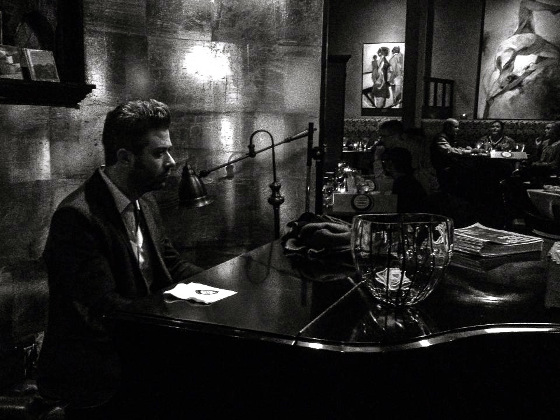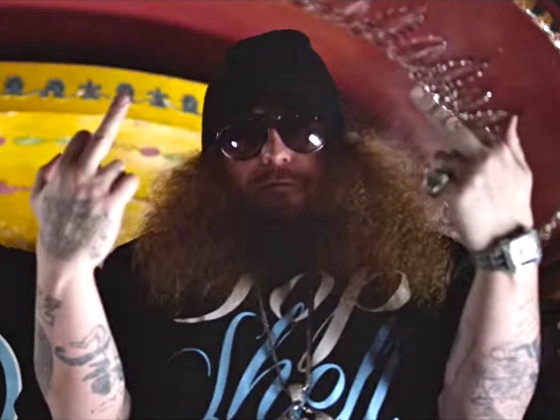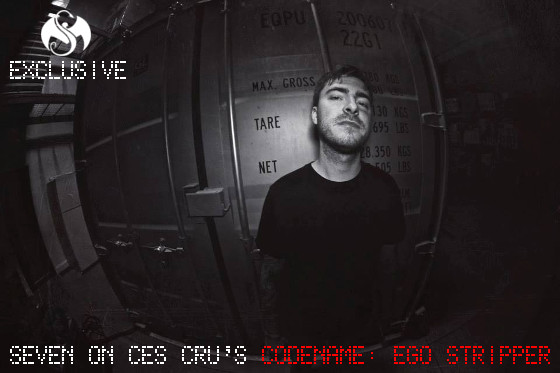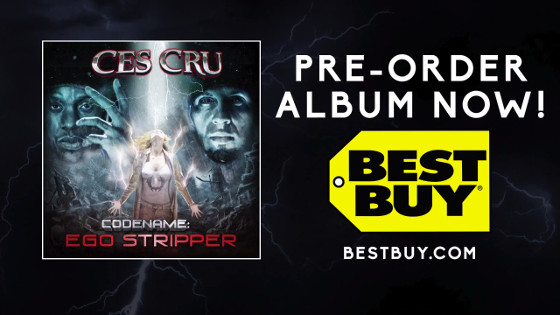‘It’s Only Every Now And Then I Get To Do Shit Like That’ – Producer Seven On CES Cru’s ‘Codename: Ego Stripper’ [Strange Music Exclusive]
Jul 29 2014
As if he already hasn’t proven himself to be one of the most versatile producers in hip hop (scratch that…music), Seven pulled out a whole new bag of tricks with his production on CES Cru’s upcoming Codename: Ego Stripper.
From the A Tribe Called Quest-influenced “Double O.T.” to the Curtis Mayfield-drenched “Pressure” to the soulful and sonorous “Hope”, Codename: Ego Stripper features some of the most adventurous production on a Strange Music record to date.
From talking to the man behind the boards on the project, we found out that Seven considers records like this a moment where he can finally do what he wants and explore new territory. From listening to the album we can certainly say you’re in for something new when you pop Codename: Ego Stripper into the deck.
Read on to find out what’s in store…
Before this album you did a lot of duties on Constant Energy Struggles. What did you take from that whole experience and how did that set the stage for you as far as this album goes?
Well I started working with them actually on 13 when we did that. I can remember sitting down with them and talking about what they want to do musically. They were dudes who were kind of like a blank canvas in a way. They are definitely artists who can be guided by a producer and molded and shaped around what a producer’s doing. I figured that out right from the top with 13. That was really dope because even though I wasn’t involved in 13 too much, I was just busy at the time, but when they did do their album I understood the angle to take for how to really be involved with them and what kind of group they are.

So when we went into Constant Energy Struggles they didn’t give me a whole lot to work off of, I just kind of listened to them and their projects before that and figured out what I could bring to the table that was different than what Lenny D was doing but would still be something that would work with them. I didn’t want to do anything that was remotely close to what they were already doing though. I wanted to bring something totally new to the table so that’s when we started doing tracks like “When Worlds Collide” and all those. So I figured it out.
When we started on Codename: Ego Stripper, I wanted to do something again with them but something totally different. We had some conversations or whatever just vaguely what to do with the album and we kind of talked about a different direction, just grimy shit mixed with trap shit mixed with shit that’s very melodic and beautiful, almost jazz influenced. Starting with them on 13 I had a real clear understanding of how an album for them can be put together.
What were some of the facets that you consider when you’re putting together an album for them?
Well my favorite track off of Constant Energy Struggles was “Juice” and I wanted to do more tracks like that for sure but make it even grimier. Then there was the flip side to that which was the “When Worlds Collide” tracks which they sound amazing on. I wanted to sort of fuse that together. I wanted it to be a marriage between “Juice” and “When Worlds Collide” on this album. That was sort of the foundation of the album when I first started going into this album. It kind of morphed and changed into something different but that was sort of what I was thinking the whole time.
So it started like hip hop drums mixed with abstract elements.
That was exactly it. That was exactly what I was thinking about going into it.
You can see how that results on songs like “Strange Creature”.
Yeah that was one of the early ones. The ones that we did first were “Jimmy Stewart”, “Strange Creature” and “Give It To Me”. That’s how the album started off so you can kind of see where that went and also how it morphed into other things.
Describe some of the other production aesthetics that are found in this album.
Well the sound outside of the “Strange Creature”s, there’s stuff like “Blindfold” which almost feels like trap. I guess all these sounds are all coming together because Godemis and Ubi they sort of want to do different things, which is okay. It’s dope because they both sound good. A track that Godemis would pick, Ubi can get on and kill it and vice versa. So it was a really interesting thing. I think on the first album they had sort of a main general sound and on this album I felt them both pulling in different directions with what they wanted to do. We just figured out a way to make it all work together. Outside of those two sounds, which to me was the grimy sound, “Jimmy Stewart” with the trap shit – I don’t even want to call it trap but just the harder shit like “Blindfold”.
The other side was the more jazz-influenced sounds and really pretty. I think that came to the table when we had a track called “Galaxy” that we got from Lenny and I listened to it like “Okay, okay, so this is another side of this album too” and then a whole bunch of tracks came from that after I heard that. I listened to it like “This could work,” and Ubi kind of showed me the idea for it. That’s how tracks like “Hope” came about. Even the last song on the album, “Axiom”, that’s sort of a mixture of everything that we did on the album. That was the last song we did for the album and it was like “Alright I’m going to make something and fuse together all the sounds so that it’s grimy, beautiful and it hits hard with 8o8s.” It’s just everything. The beautiful piano at the end that Mark Lowrey played. So yeah, it’s a really interesting album, like a three-faced album.

Yeah there are definitely a lot of aspects to it and the songs flow into each other very well but there are a lot of different sounds explored.
Yeah there is. They’re all grouped well but they could be broken down and grouped into three different albums if you take songs like “Whips” and put it with “Blindfold” and stuff like that.
What were some opportunities you had to branch out as a producer for this record? I’m sure there’s a lot of things on this record that you’ve done with different acts prior to Strange, but I don’t recall a lot of these songs being on any other Strange record.
Yeah, definitely that. Going back to the other albums and songs, like “Juice”, I’ve done lots of tracks like that. That’s kind of what I do outside of the shit that I do here. People don’t get to hear very much because no one really fits those kind of tracks so I don’t get the opportunity to make them very much. We made “Juice” on the first album and I was like “Yes! Whenever we make the next CES Cru album I want to do more of that because that’s the only platform, at least right now, that I’ll be able to do that kind of production. On this album I really tried to capitalize on that. Lots of grimy drums, breakbeat influenced shit. On the other side too, now just being here at Strangeland I can bring in musicians from around Kansas City so that’s what we did on this album. I had people come in and play on this. Live bass, the piano, lots of guitar parts.
Yeah I hear that on the album. “Pressure” is one that sticks out in that regard.
That’s actually an interesting track. That’s my contribution as the equivalent for the album because “Galaxy” was the track that Lenny had for the album just sitting around that he didn’t do anything with. It was just this beautiful live song with all these live parts on it and he never thought it would get used for anything, much less someone rapping on it. Then Ubi heard it and wanted to use it. Well “Pressure” is my version of that because that was a track that I just had laying around that was not made for this album. It was just something that I made. I didn’t know who would use it. It just existed. I don’t know if I ever imagined anyone necessarily rapping on it or whatever, but they heard it and they wanted to use it. I brought in more people afterwards to play on it. Ubi and Godi wrote to it and recorded vocals and then I brought more people in to play on it.

Yeah, there’s an additional guitar there.
Yeah Tyler played guitar on it. Everything on there is live. That’s actually a track that I made a long time ago with some musicians in Wichita. It’s just existed for awhile.
Well I’m glad it surfaced. It’s a really cool song and very unexpected.
Yeah for me too. I didn’t even really mean to play it for him. I don’t know. Maybe it just popped up in iTunes when I was playing shit for him and they heard it and they’re like “What’s that?” It’s just one of those things where it’s like “You wanna hear that one? Okay.” They listened to it and they were like “Yeah.”
Describe the working relationship you have with Ubi because from what I understand you guys create pretty well together and have come up with things together. He’s open to your suggestions and you can turn his ideas into something.
Yeah. I just have a good connection with him musically. There’s certain artists I can get on that level with where we can vibe in that area too, like topics and song direction. It’s always good when I can reach that plateau with an artist because it just opens up so many different dimensions to the music. Then I feel like we really, really create. It’s so much more than just pitching beats or whatever, you can create from the ground up. So yeah Ubi and I have a really good working relationship where we can talk a very vague idea and build it into something. It doesn’t even necessarily have to be a real developed idea or anything like that. I can also bring topics to him too. “We should do something like this for the album” and he gets it. He listens and we work good like that.
What are some examples of that on this album?
Well I mean even “Axiom” it sort of came about that way. That was one of those ones where I had the vision of the song and I pitched it to them. It wasn’t must me making the beat, they heard it as I was making the beat. I showed Ubi my idea for it and what I wanted to do with it and it developed into something.
The other one was of course the intro, “Fate”. That was another one where it was just a combination of the two ideas, me and Ubi talking what we should do for an intro. There was a lot of back and forth. We thought about what we should do for it and we weren’t quite sure. The intro for Constant Energy Struggles was so crazy. It was going to be hard to top that but I still wanted to go for something even bigger than that. I remember I sat down and started making that beat and I wasn’t really quite sure where I would go with it. I didn’t want it to be too slow or too fast. Then I realized “Well this whole album it’s been two different worlds with Ubi and Godi kind of being on different pages but in a really good way, sound wise. Let’s make the intro be like two different personalities, two split personalities. It’s the perfect way to open up this album because this album has so many different faces. We should start it off the right way and introduce that idea.” That’s why when you listen to it, halfway through it totally changes into something different, a different beat but it has the same kick, it’s in the same key and it has the same root note.
From a producer’s standpoint, what song are you the most proud of?
“Jimmy Stewart”. I love that song. That was the one man. That was the first beat I made for the album and I was like “Yeah, this album’s about to be some shit.” For sure.
Tell us about making it.
It was really a simple beat. I just wanted to make something that was grimy. I had a guitar pluck and I sampled it and put it in the keyboard and played it in that pattern. It slightly pitches down because I used the pitch bender. I put some grimy drums on it, some little hits here and there. I wanted it to sound very sampled. Then I took this pocket piano, a little weird modular thing, I don’t even know what it is. It’s just a weird thing you push the buttons on. (Plays it) There’s the sound. I just got finished with it and I was like “I’m just going to put this all over the track” and just experiment with it or whatever. I put it all over the beat and that was the beat. When it was done I was just like “Man, this is that shit.” It’s how I envisioned the album.
Do you have any favorite tracks on the record, just overall?
Well “Axiom”. I love that song a lot. “Hope” is my favorite one. That one might even be my top favorite song on the album.
Tell me about that one. Were those trumpets live?
They’re all just played from me but the bass is live. There’s nothing live on that except for the bassline that Chris Handley (Tech N9ne, “Fear”) played. It was just appropriate for that song. That was just something I was making because we were making a lot of jazz influenced stuff at the time. we had made the “Double O.T.” song and that one kind of had that vibe. It was different than what we had done on the album. It was a different tempo, same colors in a way with those chords. With a sampled chord then play it on different keys and it’s a chord, it kind of creates that Tribe Called Quest sort of feel. That’s what “Double O.T.” was sort of all about. I never get to do that either because it’s a very hip hop kind of thing to do.
So how that’s how you get that sound? You play a chord, sample it in, and then assign it to different notes?
Yeah that’s sort of the nature of the Tribe sound, to me. It’s weird because when you sample a chord like that and you play it on a different key, then you’re hitting some notes that aren’t even real notes. They don’t even exist on the keyboard. It would be like the note between B and C which is nothing, so it sounds odd.
How do you feel about the lyrical contributions on this album? The pens are pretty strong on this one.
Yeah they always fucking kill it man. What Ubi did on his solo track, “Phineas Gage” (scoffs). That shit…that was amazing. That was an interesting track actually. I know this is a little bit off the topic but that was put together because he had a verse that he just wrote out of thin air. Our idea was that he would record the verse and that I would build the beat around the verse. So I just came up with some quick drums. I think they are actually the drums that you hear in that track. All it was was the drum pattern. So I gave it to him and he recorded the verse and then gave me back the verse and then I built the rest of the beat around what he wrote. I knew where to do all the breakdowns and everything and then I put the effects on different spots on his vocals. So when he says “Superman standing next to Lex Luthor and shit” that part you can hear the low pitched vocals underneath. There’s all the echoes and everything. I just built the beat around it like I was doing a remix or something. That shit is crazy.
And Godemis is always dope. The shit he did on “Hope” was like crazy. I love that verse he did on “Hope”. It’s amazing. Those are probably my two favorite verses on the whole album: his verse on “Hope” and “Phineas Gage”.
How do you think this album reflects the growth and continuation of CES Cru?
It definitely shows them evolving. It shows a lot of growth. It shows who they’re becoming. I think Constant Energy Struggles was an amazing album. One of my favorite Strange albums of all time, ever. I don’t know what the word for it is, but they were kind of in ways still figuring things out but they did it in an amazing way. They’ve been doing it for so long already even before Strange. These dudes have been doing it for a minute so they know what they’re doing. So that album was kind of like an experiment to see “What can we get away with with this group on Strange?” “What are we allowed to do, because they’re so different from everybody else?” It was like one big experiment and then this album I feel like is more of them growing individually, almost like separate from each other, in a good way though. A group like them really works like Outkast. They’re such different individuals and they work together. That’s what CES Cru is.
How do you feel about the album now that it’s done?
I’ve listened to it and I love it. There’s nothing that I would’ve done differently with it. There’s a few tracks that we worked on that we just never got recorded and didn’t make the album. I wish we would’ve had time to do those but we just ran out of time. They were more experimental songs like “Smoke” was and that kind of feel. I guess if I had to say that I wish the album had it’s that element. We just didn’t get around to it. Everything else about it I love. “Jimmy Stewart”, “Axiom”, “Hope”, “Sound Bite” are great. The solo tracks that they have on this album are amazing. It’s a really good album.
How do you think the fans will receive it?
I think they’ll love it. I hope they can see the growth. I want them to listen to this album. I don’t want it to sound like Constant Energy Struggles Part 2. I hope nobody thinks that. I want them to look at it and go “Wow”, this is really different.” I hope it lets them see more of who Godemis and Ubiquitous are as artists individually. Rather than just being a fan of CES Cru, now you can start to become a fan of them: Ubi and. Godi. I think that’s real cool, to be on or either side of the fence. I feel like that’s what this album was about to me. Maybe not but to them but I was always producing it and that’s kind of what it felt like to me. I wanted to bring out their individuality separately.
Anything you want to say about the album before we close this up?
Just that this kind of an album I only get to do every now an then, so it’s not like I use some of these techniques and those kind of drums that are on tracks. “Strange Creature’, when we were making that Tech came in and heard it – and Tech loves breakbeats. He came in and loved the beat but was like “Those drums don’t sound like they’re done. It’s very strpped down. That’s something Wu–Tang would get on.” I remember thinking “Yeah,” because if I had to do those drums for Tech I would have to do so much more to those drums, but it’s not for Tech, it’s for CES Cru. I can make this as grimy as possible. These drums can be done right now! I just remember thinking “There’s only every once in awhile.” If every once in awhile when I work on a CES album and I can leave the drums minimal like that, that grimy and that raw style, and that just be the track, I really like try to hold on to that moment. So when you listen to the album keep that in mind.
It’s only every now and then that I get to do shit like that. This album was one of those times.
CLICK HERE TO PRE-ORDER
CODENAME: EGO STRIPPER FROM BEST BUY
-
What song are you most excited to hear based on this interview?
-
What do you think of CES over Seven productions?


